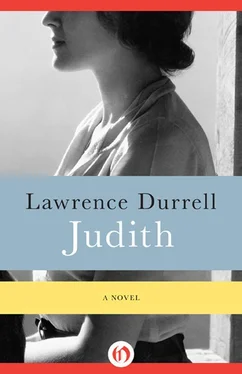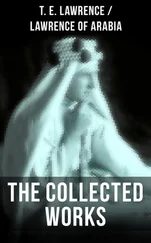He sucked his teeth loudly, and handed the picture back. The Superintendent replaced it, closed the file, and stared at his fingernails.
“I shall tell them that we are keeping an eye out, but if she came in illegally, it’s hopeless of course.” Donner nodded sagaciously. “Hopeless,” he agreed. “Well, we’ll keep it in mind.”
The Superintendent replaced the file reverently in the safe and stretched himself before re-lighting his pipe.
“See what you can do with your contacts,” he said. Donner sat, deep in thought, for a long moment.
“Apparently the young woman is quite a well-known scientist herself.”
Donner was only paying attention with half his mind. “Well,” he said, “is that all that’s on the cards for this afternoon?”
“Yes.”
“I’m glad. I thought I’d go down to Tel Aviv and see what is doing about the Abdulla case. I think we’ve got him fair and square this time.” The Superintendent grunted. Donner rose and tugged down the jacket of his uniform, which had a tendency to ride up over his belly. “Any objections, Sir?” The Superintendent shook his head and ventured a mild pleasantry. “Always glad to see the back of you, Donner,” he said. He was smiling, but it was unfortunately true. Donner frowned heavily and coughed behind his hand. “Roth,” he said, “I’ll bear it in mind.”
He would have liked to risk another military salute, but the Superintendent’s attitude about the Miko file had nettled him. He stalked down into the courtyard and purged his annoyance by adopting a bullying tone to the transport officer as he asked for the duty transport to which his rank entitled him. A jeep was duly forthcoming and he settled his large frame in it with a portentous air and closed his eyes. The drive down to the coast was not a long one, and it made a nice change. Donner was able to spend a pleasant afternoon making his juniors dance attention on him. Yes, the Abdulla case was tied in a neat bow. Donner could not resist the temptation of telling his victim so, and he spent some time in the verminous lock-up, railing at the old one-eyed Arab who was still wearing the marks of a recent “treatment” — extensive bumps and bruises. He wailed and pleaded and Donner growled agreeably at him.
It was getting dark when he left the police post and made his way swiftly across the town towards the little villa on the outskirts which they used as their interrogation centre. It was set apart from other habitations in a grove of trees. This was useful as there were no neighbours to be bothered or made curious by the sounds of beating, or the more refined types of ill-treatment which were so often necessary in order to obtain information; and victims did sometimes scream in the course of a “treatment”. The house was deserted now and the way ill-lit. Donner loosened his pistol slightly in its leather holster under his armpit. One never knew. In the darkness the tattered garden round the house looked melancholy in the extreme. But, undeterred by aesthetic considerations, Donner mounted the steps and opened the front door, switching on the lights as he did so. They revealed a large barren room with peeling walls, and an old cupboard empty of anything save scurrying mice. Its only furniture was a pock-marked desk over which hung a dusty unshaded light-bulb. A water-tap dripped obscurely in a dirty kitchen. Donner turned it off, frowning. Someone must have left it on after the last “Water-Cure” — a refinement which consisted of pouring water from a teapot up the nostrils of clients until such time as they decided to tell the truth. Donner seated himself at the desk in a creaky swivel-chair, placed his pistol at hand on the desk, and opened a copy of the Illustrated London News which he had thoughtfully brought with him in case his wait should be a long one. He had business of his own to transact that night. The anonymous letter had arrived as usual at his house, summoning him to the rendezvous. His wrist-watch ticked on. He read with concentration, shaping the words with his lips. He had not been at it long before there was a tapping at the shutter — two long and three short. He took his pistol in hand and went to the front door, opening it to admit the little figure of the Jew. “Ah, Abraham,” he said with a kind of frowning benevolence. The old man nodded his bearded head and said “Good evening.” Donner shut the door and locked it. Then he stalked back to his desk and sat behind it with a businesslike air, rubbing his hands. The Jew came softly up to the desk. Donner allowed his pistol to lie once more before him, moving it slightly to one side in order to make room for the bundle of papers his visitor carried.
“What have we got?” said Donner briskly.
“Twelve identity cards to be signed, sixty pounds.” He began to count out money from a slab of notes. Donner suddenly exploded. “Twelve!” he exclaimed in an outraged tone. “You asked for fourteen. Seventy pounds, Abraham. That’s my price.”
“Two died on the voyage,” said the little man in a meek voice.
“I can’t help that,” said Donner with bristling moustache. “You made the bargain, not me. It’s not my affair if they die.”
“Very well,” said Abraham softly, “seventy it is.”
Donner beamed at him. “That’s better,” he said with subsiding truculence and added “Put it on the table.” He watched the counting of the notes carefully, then gathered them up and put them in his capacious wallet. “All right,” he said, and detached a fountain-pen from his breast pocket. The little man laid a bundle of identity cards on the desk and Donner began to sign them, his tongue protruding slightly from between his teeth as he concentrated on the task. He signed them in the name of a predecessor of his who had held the post years before and who, being now dead, was obviously beyond recall if there were any questions asked. The cards were all greatly antedated in order to take advantage of the residence laws.
The little Jew said: “As a matter of fact, there were two children born on the trip as well. I suppose you don’t want to charge for them?”
Either Donner was too obtuse to sense the contemptuous cutting edge of the remark, or else he did not feel disposed to regard himself as insulted. He raised his great head and took on his most innocent expression, blue eyes wide with reproach. “My dear Abraham,” he said, “you are joking. After all, I am British, you know, my boy.”
“So it would seem,” said the little man, scratching his ear. These subtleties were too much for Donner. He waved a hand and said: “I told you I was being transferred, didn’t I? I won’t be much use to you in Syria, will I?”
“You never know.”
“Anyway, I don’t know the exact dates yet — but keep in touch. There may be ways.”
“We will.”
Donner blew on his signatures, disposing the cards across the desk in order to let them dry the better. Suddenly he got a shock, for the name Judith Roth stared up at him from the piece of pasteboard. There was no mistake. He was overtaken by a sudden feeling of irresolution. Should he ask Abraham directly… it might make him feel suspicious. As he signed the card he thought furiously, comparing the photograph with the memory of the newspaper cutting. It almost seemed the same picture. His brain worked at top speed, exploring the possibilities. Was there any way he might turn his find to his personal benefit? Donner’s self-interest was a plant of long and sturdy growth: the old Irish Constabulary had planted it, the war had nourished it. After all, the sale of dispensations is one of the oldest police habits in the world. He had a sudden brainwave. With his head still lowered over his work, he asked casually: “Where are you going to send them all this time? Up north?”
Читать дальше












